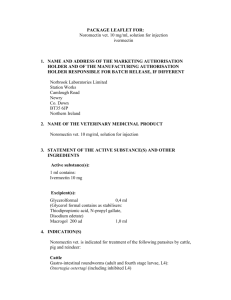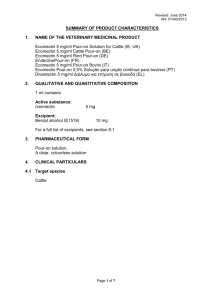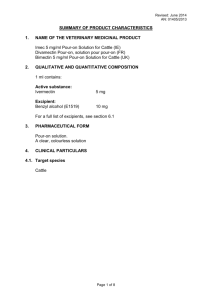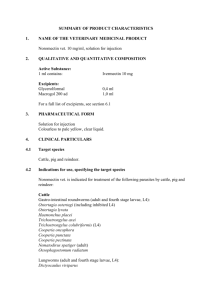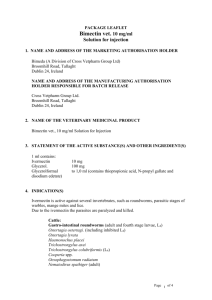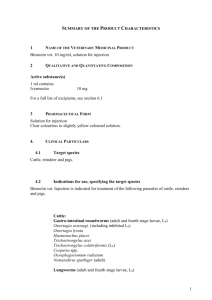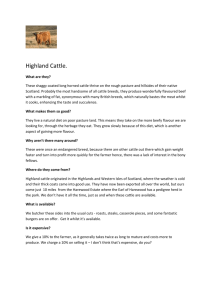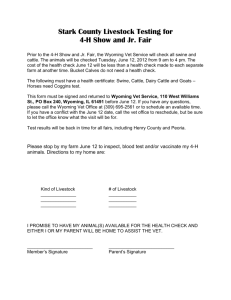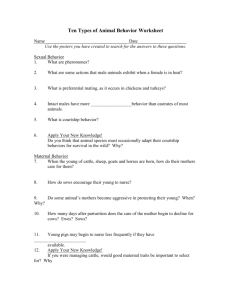Noromectin Pour-on vet. pour
advertisement
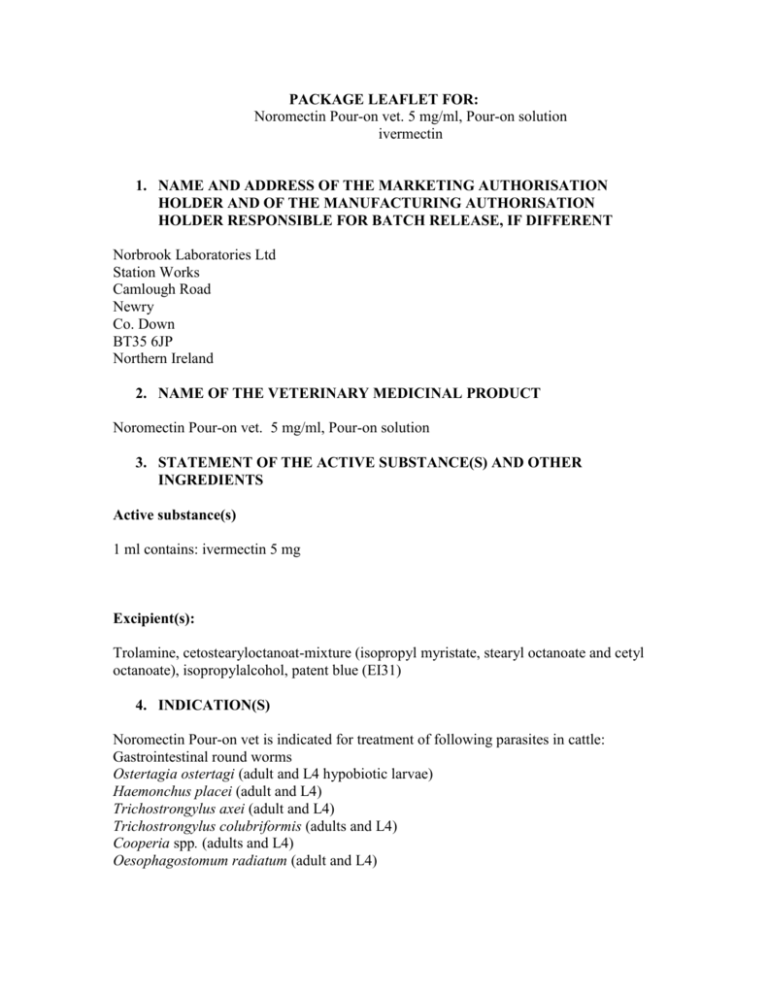
PACKAGE LEAFLET FOR: Noromectin Pour-on vet. 5 mg/ml, Pour-on solution ivermectin 1. NAME AND ADDRESS OF THE MARKETING AUTHORISATION HOLDER AND OF THE MANUFACTURING AUTHORISATION HOLDER RESPONSIBLE FOR BATCH RELEASE, IF DIFFERENT Norbrook Laboratories Ltd Station Works Camlough Road Newry Co. Down BT35 6JP Northern Ireland 2. NAME OF THE VETERINARY MEDICINAL PRODUCT Noromectin Pour-on vet. 5 mg/ml, Pour-on solution 3. STATEMENT OF THE ACTIVE SUBSTANCE(S) AND OTHER INGREDIENTS Active substance(s) 1 ml contains: ivermectin 5 mg Excipient(s): Trolamine, cetostearyloctanoat-mixture (isopropyl myristate, stearyl octanoate and cetyl octanoate), isopropylalcohol, patent blue (EI31) 4. INDICATION(S) Noromectin Pour-on vet is indicated for treatment of following parasites in cattle: Gastrointestinal round worms Ostertagia ostertagi (adult and L4 hypobiotic larvae) Haemonchus placei (adult and L4) Trichostrongylus axei (adult and L4) Trichostrongylus colubriformis (adults and L4) Cooperia spp. (adults and L4) Oesophagostomum radiatum (adult and L4) Lungworms Dictyocaulus viviparus (adult and L4) Warbles (parasitic forms) Hypoderma bovis Hypoderma lineatum Lice Sucking lice Linognathus vituli Haematopinus eurysternus Biting lice Damalinia bovis Manage Chorioptes bovis Sarcoptes scabiei var. bovis Flies Haematobia irritans 5. CONTRAINDICATIONS Animals showing hypersensitivity to ivermectins should not be treated. 6. ADVERSE REACTIONS No adverse reactions has been reported at recommended dosing. If you notice any serious effects or other effects not mentioned in this leaflet, please inform your veterinary surgeon. 7. TARGET SPECIES Cattle 8. DOSAGE FOR EACH SPECIES, ROUTE(S) AND METHOD OF ADMINISTRATION Topical administration at a dose of 1 ml per 10 kg bodyweight (corresponding to the recommended dose of 0.5 mg per kg bodyweight). The formulation should be applied along the mid-line of the back in a narrow strip between the withers and tailhead. To ensure administration of a correct dose, body weight should be determined as accurately as possible; accuracy of the dosing device should be checked. 9. ADVICE ON CORRECT ADMINISTRATION Do not treat cattle when their hide is wet, dirty animals or animals with manage or scab lesions at the site of application, since this might reduce the effect of the product. Rain within two hrs following application might also reduce the effect. Assess bodyweight as accurately as possible before calculating the dosage. 10. WITHDRAWAL PERIOD Meat and offal: 21 days. Lactating dairy cattle must not be treated. Dry cows or heifers must not be treated later than 60 days before calving. 11. SPECIAL STORAGE PRECAUTIONS Keep out of the reach and sight of children. Store below 25°C Keep container in the outer carton in order to protect from light. Inflammable. Keep the container tightly closed. The containers should be stored in a stand up position. If stored below 0°C the solution may appear cloudy. Allowing to warm to room temperature will restore the normal appearance without affecting the efficacy. Do not use cloudy solution. Do not use after the expiry date stated on the carton. 12. SPECIAL WARNINGS This product should only be used in well-ventilated areas or outdoors. Use protective gloves. Avoid contact to skin and eyes. If accidental contact to skin occurs wash the affected area immediately with soap and water. If accidental eye exposure occurs, flush the eyes immediately with water and get medical attention. Noromectin Pour-On vet has been formulated for specific use in cattle. In dogs and cats severe adverse reactions, including fatalities might occur from the concentration of ivermectin in this product if the animals get access to split solution. Pregnancy and lactation Noromectin Pour-on vet may be administered to lactating beef cattle and during all periods of lactation and gestation. Noromectin must not be administered to lactating dairy catle or dry cows or heifers later than 60 days before calving if the milk is for human consumption Care should be taken to avoid the following practices because they increase the risk of development of resistance and could ultimately result in ineffective therapy: Too frequent and repeated use of anthelmintics from the same class, over an extended period of time. Underdosing, which may be due to underestimation of body weight, misadministration of the product, or lack of calibration of the dosing device (if any). Suspected clinical cases of resistance to anthelmintics should be further investigated using appropriate tests (e.g. Faecal Egg Count Reduction Test). Where the results of the test(s) strongly suggest resistance to a particular anthelmintic, an anthelmintic belonging to another pharmacological class and having a different mode of action should be used. Resistance to ivermectin (an avermectin) has been reported in Cooperia oncophora in cattle within the EU, in Teladorsagia in cattle in developed countries such as New Zealand and Haemonchus in cattle outside the EU. Therefore the use of this product should be based on local (regional, farm) epidemiological information about susceptibility of nematodes and recommendations on how to limit further selection for resistance to anthelmintics. 13. SPECIAL PRECAUTIONS FOR THE DISPOSAL OF UNUSED PRODUCT OR WASTE MATERIALS, IF ANY Ivermectin is extremely dangerous to fish and aquatic life. Drug containers and residual content should be disposed of safely and handed over to the Pharmacy for destruction. 14. DATE ON WHICH THE PACKAGE LEAFLET WAS LAST APPROVED 2015-07-14 15. OTHER INFORMATION Pack sizes: 250 and 1000 ml (with dispenser) and 2.5 l (collapsible backpacks).
